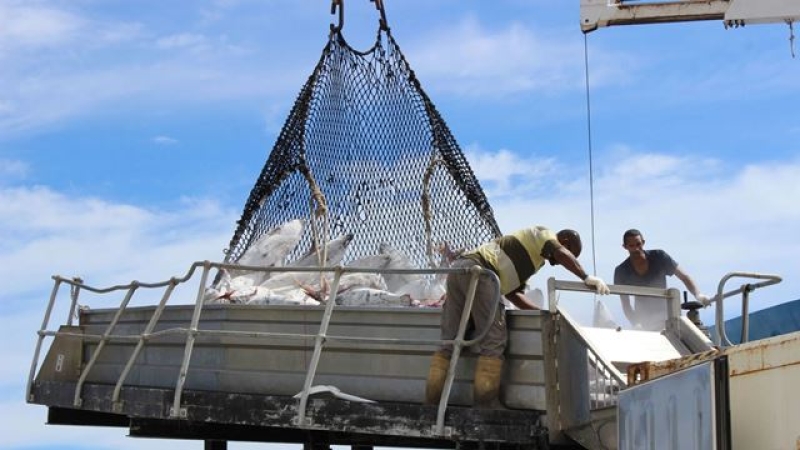- CA Yunus pays homage to Liberation War martyrs on Victory Day |
- Bangladesh capital market extends losing streak for second day |
- Bangladesh celebrates Victory Day Tuesday |
- 'Different govts presented history based on their own ideologies': JU VC |
The Ocean: Changing Lives and Powering Growth

Promoting sustainable fishing in the sea. World Bank Group.
The ocean powers more than 100 million full-time equivalent jobs and feeds over three billion people. It regulates the weather and supports biodiversity. The ocean adds $2.6 trillion to the world economy per year. Protecting this blue expanse is a gamechanger for people, marine life, economy and planet.
Countries have stepped up efforts to manage ocean resources more sustainably so that the ocean can continue to produce economic and social benefits, while their ecosystems are protected.
In Pacific Island countries, fish supply per capita decreased by 14 percent between 2007 and 2021. This causes a problem for Kiribati, which has one of the highest rates of fish consumption of any country around the world due to lack of alternatives.
The fisheries industry - mostly the coastal commercial and coastal subsistence fisheries - makes up 34 percent of the country’s GDP. Effective fisheries management is a priority. This includes management for coastal fisheries that provide most communities with their livelihoods and sustenance.
Maaria’s work is part of a broader effort by the Government of Kiribati, supported by the World Bank through the Pacific Islands Regional Oceanscape Program (PROP), to safeguard its territorial seas and its Exclusive Economic Zone (EEZ), the largest in the world. Income from industrial tuna fisheries in Kiribati’s EEZ is the country’s most important source of revenue at 65.5 percent of Gross National Income.
For the ocean to play its role in providing jobs and livelihoods, countries need to prioritize its restoration and sustainable management. Only then can it truly recover from overexploitation, erosion, pollution, climate change and extreme weather events.
For decades, the West African coast has been affected by fast-moving coastal erosion, with Benin and Togo losing 15 meters of coastline every year.
“Fish thrive in pits. With WACA’s support, underwater excavations were dug to collect the sand used to rebuild the beaches. When fish pass by, they are funneled toward the shore. This is a boon for us."Djourdé Bouboukari, a former student turned fisherman in Togo
"On good fishing days, our income can reach FCFA 3 to 4 million (about $8,000) per day," adds Dosseh Legbeze, chairman of Togo’s National Federation of Fishermen’s Cooperatives.
The WACA program supports nine West African countries -- Benin, Côte d’Ivoire, The Gambia, Ghana, Guinea-Bissau Mauritania, São Tomé and Príncipe, Senegal, Togo -- in managing shared coastal resources and protecting coastal communities through policy reform, institutional support, and local interventions. To date, it has reduced flood risk for 16,242 households, created 9,260 jobs, and restored over 28,000 hectares of ecosystems.
For women entrepreneurs, the lack of collateral, financing and gender biases are major obstacles that keep them behind. With the right investment, women can be game changers. In Zanzibar, women seaweed farmers were empowered to grow their business.
In Zanzibar, the government provided soft loans and over 500 boats to seaweed farmers. This reduced physical harvesting costs and the time to transport seaweed from the farm to drying racks.
Additionally, a switch to more efficient farming methods, such as deep-water farming, yielded higher-quality seaweed.
With these new investments, women seaweed farmers were able to reduce their production costs, grow their business and save over $6 per day.
The production of Cottonii, a seaweed species, increased sixfold and benefited almost 16,000 members, mostly women.
Women participated actively in the seaweed industry by using small boats.
Now, women farmers can sell their produce competitively to any blue company. In addition, women have reinvested their profits into local businesses and initiatives.
In 2022, in a first for Central and Eastern Europe, the World Bank's private sector arm, the International Finance Corporation (IFC) issued a landmark €100 million first blue financing loan to Banca Transilvania.
One beneficiary, fish farmer George Ionescu-Vitzu, co-founded a fishery cooperative focused on sustainability.
By limiting the number of cages in Oasa Lake, using the highest quality equipment, and prioritizing maintenance and upkeep, they have protected the water quality and produced high quality fish.
From Kiribati to Benin and Togo to Zanzibar, these programs have a common goal: to sustainably use ocean resources to boost economic growth, improve livelihoods, create jobs, and preserve ocean health. With support from the PROBLUE multi-donor trust fund, the World Bank’s Blue Economy portfolio is at the heart of this approach.
None of these programs would have been successful without game changers from coastal communities like Maaria and Djourdé. They have the solutions. With financial support, training, and guidance, they have become game changers in their community - and beyond.
These stories show what is possible when countries invest in local communities, prioritize public awareness, and tap into new sources of financing. When more countries learn from each other and scale up what works, the ocean can continue to change lives and power growth. – World Bank Group

